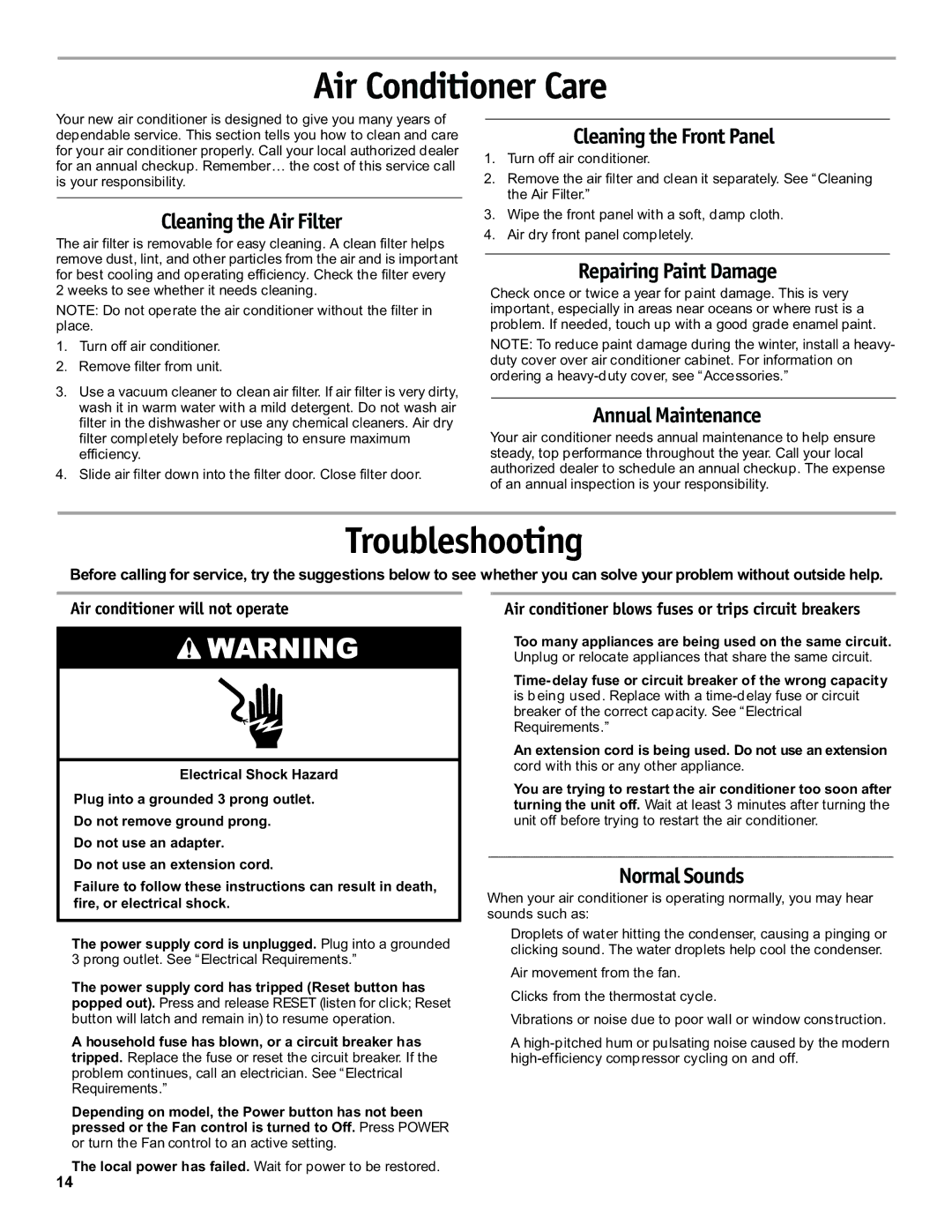
Air Conditioner Care
Your new air conditioner is designed to give you many years of dependable service. This section tells you how to clean and care for your air conditioner properly. Call your local authorized dealer for an annual checkup. Remember… the cost of this service call is your responsibility.
Cleaning the Air Filter
The air filter is removable for easy cleaning. A clean filter helps remove dust, lint, and other particles from the air and is important for best cooling and operating efficiency. Check the filter every 2 weeks to see whether it needs cleaning.
NOTE: Do not operate the air conditioner without the filter in place.
1.Turn off air conditioner.
2.Remove filter from unit.
3.Use a vacuum cleaner to clean air filter. If air filter is very dirty, wash it in warm water with a mild detergent. Do not wash air filter in the dishwasher or use any chemical cleaners. Air dry filter completely before replacing to ensure maximum efficiency.
4.Slide air filter down into the filter door. Close filter door.
Cleaning the Front Panel
1.Turn off air conditioner.
2.Remove the air filter and clean it separately. See “Cleaning the Air Filter.”
3.Wipe the front panel with a soft, damp cloth.
4.Air dry front panel completely.
Repairing Paint Damage
Check once or twice a year for paint damage. This is very important, especially in areas near oceans or where rust is a problem. If needed, touch up with a good grade enamel paint.
NOTE: To reduce paint damage during the winter, install a heavy- duty cover over air conditioner cabinet. For information on ordering a
Annual Maintenance
Your air conditioner needs annual maintenance to help ensure steady, top performance throughout the year. Call your local authorized dealer to schedule an annual checkup. The expense of an annual inspection is your responsibility.
Troubleshooting
Before calling for service, try the suggestions below to see whether� you can solve your problem without outside help.
Air conditioner will not operate
![]() WARNING
WARNING
Electrical Shock Hazard
Plug into a grounded 3 prong outlet. Do not remove ground prong.
Do not use an adapter.
Do not use an extension cord.
Failure to follow these instructions can result in death, fire, or electrical shock.
�Air conditioner blows fuses or trips circuit breakers
�Too many appliances are being used on the same circuit.
�Unplug or relocate appliances that share the same circuit.
�Time-delay fuse or circuit breaker of the wrong capacity
is being used. Replace with a
� Requirements.”
� An extension cord is being used. Do not use an extension
cord with this or any other appliance.
� You are trying to restart the air conditioner too soon after turning the unit off. Wait at least 3 minutes after turning the unit off before trying to restart the air conditioner.
Normal Sounds
When your air conditioner is operating normally, you may hear sounds such as:
�The power supply cord is unplugged. Plug into a grounded 3 prong outlet. See “Electrical Requirements.”
The power supply cord has tripped (Reset button has popped out). Press and release RESET (listen for click; Reset button will latch and remain in) to resume operation.
A household fuse has blown, or a circuit breaker has tripped. Replace the fuse or reset the circuit breaker. If the problem continues, call an electrician. See “Electrical Requirements.”
Depending on model, the Power button has not been pressed or the Fan control is turned to Off. Press POWER or turn the Fan control to an active setting.
The local power has failed. Wait for power to be restored.
�Droplets of water hitting the condenser, causing a pinging or clicking sound. The water droplets help cool the condenser.
�Air movement from the fan.
�Clicks from the thermostat cycle.
�Vibrations or noise due to poor wall or window construction.
�A
14
